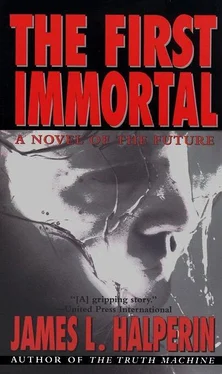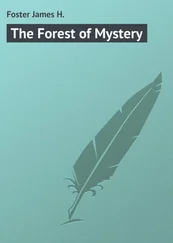“And when progress ends, what’s the purpose of humanity?” Gary asked.
“Same as it’s always been,” Ben said. “We exist for our own joy, and to bring that joy to those we love.” He gently kissed Margaret Callahan Smith, step-granddaughter, clone of his past, embodiment of his future. Then he asked Gary, “You sure you’re okay with this, son?”
“If Margaret’s certain, then so am I.”
“I am,” she said. “I intend to love and cherish your father forever.”
Gary turned to Ben. “Gives the expression ‘She was made for you’ an almost literal meaning.” He paused, wondering if his sentiment had come out as intended. “And I couldn’t be happier for you both.”
To Gary, the most amazing aspect of his statement was that he meant it.
November 1, 2104
—All of the oldest Neanderthals announce their intention to vote in this month’s World Government elections. Of 612 Neanderthals currently living on Earth, only 17 have yet attained voting age. Nine say they would cast their ballots for Vice President Andreopolus were the election held today; six intend to vote for Councilor Parrino; two remain undecided.—The names Johannes Brahms, Victor Hugo, Stephen King, Christopher Reeve, Gary Franklin Smith, and John Wayne are added to the Honor Roll for the Ages Monument in Hamilton, Bermuda. The monument, designed by Lillian Upton, now bears the names of 297 artists judged by the Monument Advisory Committee to have “inspired humanity throughout history.” Not counting clones, Reeve and Smith are only the 18th and 19th living persons to be so honored.
As the day began, Margaret kissed Ben the same way Marge always had: same suction, same moistness, same pressure. She gently pulled herself back, disentangling her supple, sweat-glistened body from his. “That was wonderful, Benny!” she said, and cheerfully inserted another old coin into the piggy bank by the side of their bed.
Just like Marge, Ben thought.
They’d been married forty-seven weeks, and had made love 584 times.
About on schedule.
“Only thirty-six more days before we start removing them,” she said.
“And how long you think it’ll take us to empty old Porky?” he asked, stroking her back the way she had always liked to be cuddled. Marge sighed and Ben smiled; he knew exactly what she wanted, as always.
“It took almost twenty months the first time we were married,” she said, “but when Gary was born, it slowed us down a little. This time, we’ll do it in fifteen.”
“You always were up to a challenge.”
She was Marge. At least in their minds. What a miracle!
That afternoon, Ben and Gary stood thumbing through the folios of old maps at Ashley’s Antique and Knickknack Emporium in Falls Church, Virginia. The place was a bit seedy, but fascinating, offering almost-nice wicker furniture circa 1880, precybernetic toys from the early twenty-first century, and everything in between. Prices ran the gamut, too: near-bargains to the absurdly overpriced.
Both men loved shops like this. Every time they ran across a new one, they felt as if they’d stepped through a wormhole in interstellar space, falling backward into unpredictable epochs.
Pulling out a beautifully watercolored, freehand map of 1890 Cape Cod, Gary nudged his father. “This one seems too cheap. And even better, I like it.”
Ben ran his molecular scanner over Gary’s selection. “Kind of amazing in a joint like this. Hasn’t even been microrepaired. If you don’t buy it, I will.”
Gary offered a wolfish grin. “Don’t hold your breath. It’s already mine.”
Herb Ashley ambled over. The owner was one of those very peculiar people who had let his body age to about thirty-five before having his nanos programmed to maintain that physical aspect. Ben and Gary had seen others like Ashley, all involved in the antique collectibles business. Apparently this was done to add an aura of authenticity to their trade.
Ashley nodded. “Good choice, my friends.” Of course, he said that to everyone.
“I’ll take it,” Gary said, then resumed thumbing. Ashley’s register AI had already debited Gary’s account and transferred ownership.
“You two check ScienceWatch today?” Ashley asked, seemingly out of nowhere.
Ben shook his head.
“Bad news,” Ashley declared. “Really bad. In less than 120,000 years, apparently, half the atoms in your brain and body break down. Shoot. I guess by then we’ll only be halfway the same people we are today.”
“Actually,” Ben said, “that would be 120 million years.” Ashley’s face brightened and his posture straightened noticeably. “Oh, thank goodness. I’ve been depressed all afternoon.”
Ben and Gary traded glances. Both bit their tongues. This man wasn’t kidding with them; he was utterly serious.
After about a minute Gary asked, “How old are you, Herb?”
“A hundred sixteen.”
Ben cleared his throat. He wasn’t delicate about it. “Let’s see, Herb. In your lifetime, you’ve gone from an at-birth life expectancy of maybe seventy-nine years to a lifetime that’s arguably infinite, right?”
“Well, yeah. Assuming the comets don’t get me.” He chuckled.
Ben immediately recognized these words as a throwaway line, almost a joke. Ten years ago, everyone had still been terrified of the Nemesis threat, but these days people seemed a lot more confident that astrophysicists could eventually come up with a foolproof plan. Or if not, the nanoscientists could probably put every casualty back together.
It was amazing how easily human thinking adapted over time, Ben mused. Yet few could stand to shift their core views all at once. Shock led to confusion, most often temporary; then it usually rectified itself.
“So,” Ben asked—he couldn’t help it—“you were worried that in a thousand times as long as you’ve already lived, there wouldn’t be any more quantum breakthroughs?”
Ashley glowered. “What’s your point?”
Herb Ashley’s two customers laughed so long and so hard that he finally asked them to leave.
January 14, 2125
—All life signs from the nine mammalian and six avian subjects on Orion II continue to register in the normal range after 16 days in space. The lightsail-powered spaceship has already achieved a velocity of .39 light-speed. Orion’s grand tour of our solar system will last five more months and reach a maximum speed of .84 L.S. WASA officials anticipate full recovery of all 15 subjects, clearing the way for humaned flights late next year and journeys to other solar systems within the next few decades.—ATI Co-Chairpersons Randall Petersen Armstrong and his wife, Maya Gale, appear close to perfecting a brain circuitry regimen that will replace certain nerve impulses with electrical current, allowing humans to think at computer speed. The WFDA announces that it stands ready to rule on the efficacy of the Armstrong-Gale Process immediately upon consummation, perhaps as early as next month. It seems likely that almost every human in the solar system will purchase the product once it becomes available. Beyond its recreational implications, AIs project that this innovation will greatly improve odds for indefinite human survival against the forces of nature.
I’ve long enjoyed collecting and toying with early computer programs, ancient floppies, and old CDs. In data of the past, I often find inspired nuggets to help place the here and now and my visions of the future into proper perspective. What I like best is to dump the encoded material into my AIs, especially the new mind-reading Random Image Organizers. What emerges always comes as a surprise. The thing might tell me a story, draw out visuals, create a VR movie, even spin an essay.
Читать дальше












